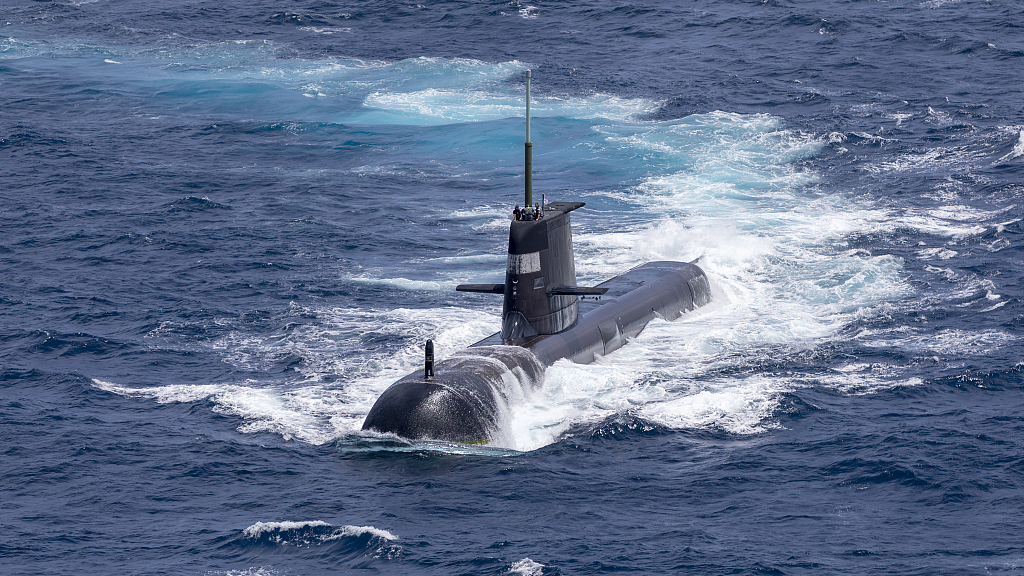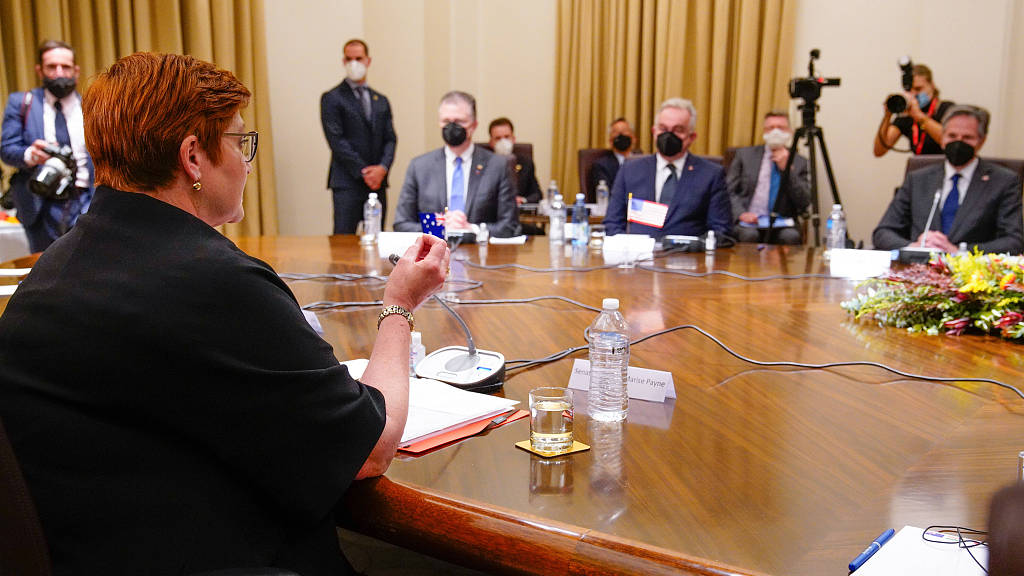
Royal Australian Navy submarine HMAS Rankin is seen during AUSINDEX 21, a biennial maritime exercise between the Australian and Indian navies in waters off Darwin, northern Australia, September 5, 2021. /VCG
Royal Australian Navy submarine HMAS Rankin is seen during AUSINDEX 21, a biennial maritime exercise between the Australian and Indian navies in waters off Darwin, northern Australia, September 5, 2021. /VCG
Editor's note: Daryl Guppy is an international financial technical analysis expert. He has provided weekly Shanghai Index analysis for media for the Chinese mainland for more than a decade. Guppy appears regularly on CNBC Asia and is known as "The Chart Man." He is a national board member of the Australia China Business Council. The article reflects the author's opinions and not necessarily those of CGTN.
Just five days after the fall of Singapore in 1942, the Japanese bombed my home city of Darwin in northern Australia. It remains the largest attack by a foreign force on Australia. This week remembrance services for the bombing of Darwin were attended by the Australian prime minister, the Japanese ambassador, the U.S. consul general and other political and military leaders.
This was an opportunity for all speakers to reflect on the development of Australian foreign policy and its current focus. The politicians used the visit as an opportunity to promote the defense arrangement with the United States and to acknowledge the changed circumstances that now see Japan's Impex operate a major gas hub from Darwin. Their talk was much about the new-found Quad community.
Their comments missed the real historical significance of the Japanese attack. It was a rude awakening that Australia's reliance on a great power was misplaced and a dangerous folly. The attack followed Winston Churchill's diversion, despite Australian objections, of Australian troops to Singapore, where they were promptly captured. It was clear that the great power Britain put its interests ahead of Australia's.
This historic message was quickly understood by then Prime Minister John Curtin. Within days he turned to America, saying "I make it quite clear that Australia looks to America, free of any pangs as to our traditional links or kinship with the United Kingdom."

Australian Foreign Minister Marise Payne makes opening remarks during a meeting of the Quadrilateral Security Dialogue Quad foreign ministers in Melbourn, Australia, February 11, 2022. /VCG
Australian Foreign Minister Marise Payne makes opening remarks during a meeting of the Quadrilateral Security Dialogue Quad foreign ministers in Melbourn, Australia, February 11, 2022. /VCG
But within weeks of this realignment, Australian interests were again being sidelined by the United States. Poorly trained Australian militia troops on the Kokoda track fought the Japanese to a standstill in New Guinea. The American General Douglas MacArthur derided them, saying "the Australians have proven themselves unable to match the enemy in jungle fighting." The Australian high command seemed to agree. In an address to exhausted Kokoda troops, Australia's Field Marshall Thomas Blamey gave them the impression that "they ran like rabbits" from the Japanese. The implication of cowardice and MacArthur's insistence that all victories were allied or U.S. victories downplayed Australia's role for years.
It set a precedent in the relationship and it wouldn't be the last time Australia surrendered to the American narrative of events. The false Kokoda narrative continued unchallenged in Australia for more than 50 years.
It took another 30 years before Australia developed an independent foreign policy. In separate conversations this week, both former Australian ambassador to China Geoff Raby and former deputy ambassador to China John Lander expressed alarm at the erosion of Australian sovereignty as Australia has become more closely tied to the United States. Both diplomats supported a return to the independent foreign policy pursued by Australia in previous years. Prime ministers Malcolm Fraser, Bob Hawke and Paul Keating all favored an independent foreign policy that did not tie Australia to the United States.
These leaders endorsed the swing to U.S. but also pursued diplomatic trajectories that enhanced Australia's participation and standing within the region. Keating's vision of APEC was established despite the unenthusiastic reception by two American presidents.
Adopting an independent foreign policy is not a rejection of the United States. It is a recognition that Australia's interests do not always coincide with its large and powerful friends. It's an acknowledgement that the national interest of the larger partner will always trump the interests of Australia.
The current Australian prime minister and leadership make the same mistakes as the Roaring Twenties prime ministers who believed Australia and UK interests were indivisible. The current leadership believes Australia's interests with the U.S., and now Japan, are indivisible. This is not only a rejection of the possibility of an independent foreign policy but it also represents a significant change in the great power relationship.
In the past, Australia supported the U.S. in many of its wars. John Landers suggests that Morrison now wants to fight proxy wars on behalf of the United States. That's a significant and dangerous change because it undermines Australia's sovereignty by effectively surrendering the formulation of foreign policy to a foreign power.
Those who distort history cannot learn from history. Australia and those in my home city of Darwin, will be forever grateful for the support given by U.S. forces in 1942. However, being grateful is not the same as believing that the interests of the two countries will always be aligned. Then, as now, the strategic importance of Darwin is measured in American, not Australian terms. Without an independent foreign policy, Australia's sovereignty is as much under threat now as it was in 1942 when the Japanese attacked.
(If you want to contribute and have specific expertise, please contact us at opinions@cgtn.com.)

